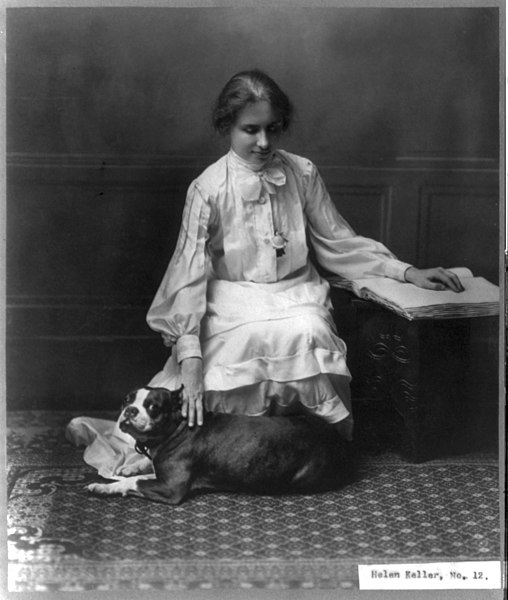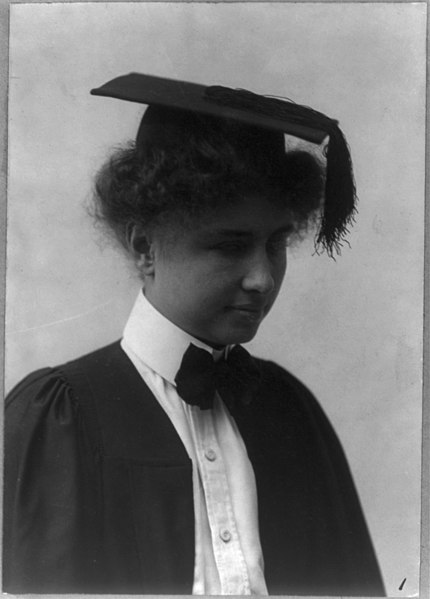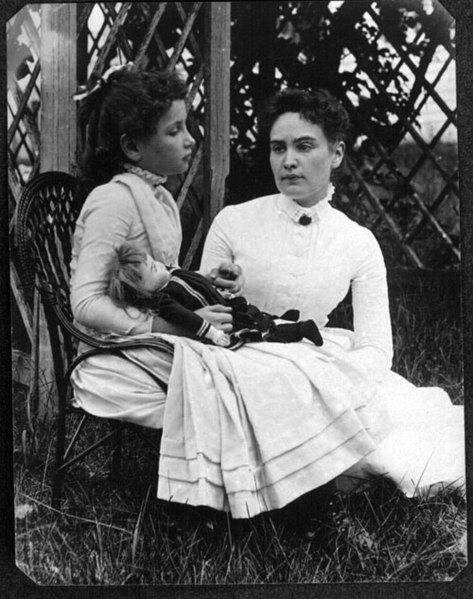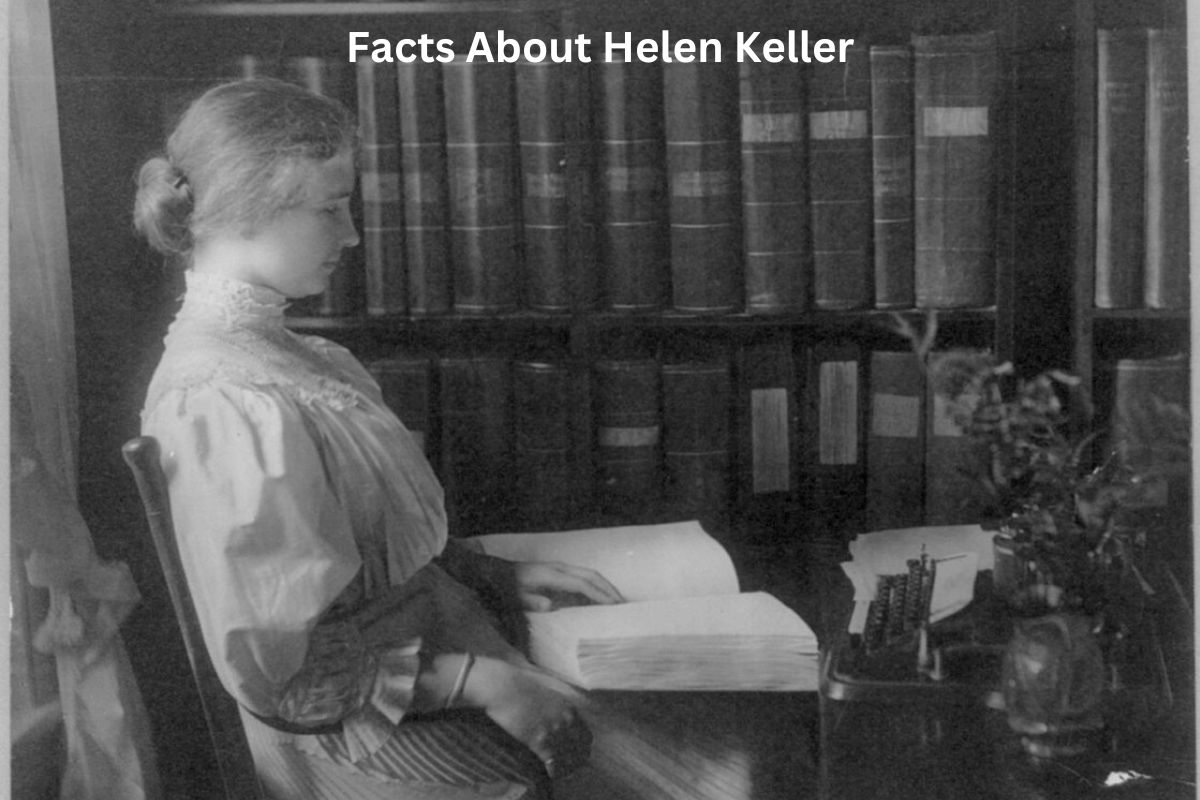Helen Keller, born in 1880, faced extraordinary challenges when she lost her sight and hearing at 19 months old due to illness. With the guidance of her teacher, Anne Sullivan, Keller learned to communicate through tactile sign language, opening up a new world for her.
Her determination led her to graduate with honors from Radcliffe College in 1904, making her the first deaf-blind person to earn a Bachelor of Arts degree. Keller’s autobiography, “The Story of My Life,” detailed her remarkable journey.
Beyond academics, Keller became a passionate advocate. She tirelessly championed disability rights, education, and improved living conditions for people with disabilities. Her global travels and speeches inspired countless people.
Keller’s advocacy extended to broader issues like women’s suffrage, labor rights, and pacifism. Her socialist beliefs drove her involvement in the Socialist Party of America and co-founding the American Civil Liberties Union (ACLU) in 1920.
Her life story remains a beacon of hope, demonstrating the power of resilience, education, and activism in overcoming adversity and creating lasting change.
Helen Keller Facts
1. Born on June 27, 1880, in Alabama, USA
Helen Keller was born on June 27, 1880, in Tuscumbia, a small town in Alabama, USA. Her early childhood was typical until she fell seriously ill at 19 months old, possibly due to scarlet fever or meningitis.
Also Read: Helen Keller Accomplishments
This illness left her both deaf and blind, cutting her off from the world of communication and understanding that most people take for granted.

2. Lost her sight and hearing at 19 months due to illness
The loss of her sight and hearing dramatically changed Keller’s life. Deprived of these senses, she became frustrated and isolated, unable to understand or engage with the people and environment around her.
This isolation created immense challenges for both Helen and her family, who struggled to find a way to connect with her.
3. Learned to communicate through touch and sign language with the help of Anne Sullivan
Keller’s life took a transformative turn when Anne Sullivan, a skilled and determined teacher, entered her life. Sullivan had experience working with visually impaired individuals and was herself visually impaired for some time.
Also Read: Timeline of Helen Keller
Through sheer determination, patience, and a groundbreaking approach to education, Sullivan taught Keller to communicate using a manual alphabet, which involved spelling words into Keller’s hand.
One of the most pivotal moments in Keller’s life occurred when Sullivan famously pumped water onto one of Keller’s hands while repeatedly spelling the word “water” into her other hand.
This breakthrough connected the tactile sign language Sullivan was teaching with the concept of language itself. Keller quickly grasped the connection between the word and the flowing water, marking a pivotal moment of understanding and communication.
This incident showcased the potential for her to learn and communicate, providing her with a lifeline to the world around her.
4. Graduated with a Bachelor of Arts degree from Radcliffe College in 1904
Despite the immense challenges she faced, Helen Keller’s determination and hard work led her to achieve academic excellence. In 1904, she graduated with honors from Radcliffe College, becoming the first deaf-blind person to earn a Bachelor of Arts degree.
This accomplishment not only demonstrated her intellectual capabilities but also shattered preconceived notions about the potential of individuals with disabilities.
5. Wrote an autobiography called “The Story of My Life”
Keller’s autobiography, “The Story of My Life,” published in 1903, provided a poignant account of her struggles, triumphs, and the pivotal role of her teacher, Anne Sullivan, in her life.
The book became an international sensation, offering insight into her journey of learning and discovery. Through her writing, Keller not only chronicled her personal experiences but also advocated for the education and rights of people with disabilities.

6. Advocated for disability rights and education
Helen Keller’s life took on a broader purpose beyond personal achievement. She became a passionate advocate for individuals with disabilities, focusing on the importance of education, accessibility, and understanding.
Her advocacy efforts aimed to dispel misconceptions about people with disabilities and promote inclusivity. Keller believed that education was the key to breaking down barriers and enabling individuals to reach their full potential.
7. Supported women’s suffrage and labor rights
Keller’s impact extended beyond the written word. She embarked on global tours, delivering inspiring speeches to diverse audiences. Her speeches covered a wide range of topics, from her personal experiences to broader societal issues.
Through her eloquence and ability to connect with people, Keller challenged societal norms, advocating for equality and social justice. Her ability to engage and captivate audiences transcended cultural and language barriers, leaving a lasting impression on all who heard her speak.
8. Traveled globally to give speeches on various topics
Helen Keller’s influence extended far beyond her local community. She embarked on journeys around the world, captivating audiences with her powerful speeches that covered a wide array of topics.
Her ability to connect with diverse cultures and people allowed her to spread her message of empowerment, understanding, and social change.
Keller’s speeches were not confined to a single theme; she addressed an array of subjects, including disability awareness, education, women’s suffrage, labor rights, pacifism, and social justice.
Her personal experiences and profound insights resonated with people from various backgrounds, inspiring them to reconsider their perceptions and challenge societal norms.
9. Member of the Socialist Party of America
Helen Keller’s advocacy extended beyond disability rights and education. She was deeply engaged in political and social issues of her time. Keller embraced socialist ideals and became an active member of the Socialist Party of America.
She believed that socialism’s focus on equality, workers’ rights, and social justice aligned with her broader vision for a more just and inclusive society.

10. Co-founded the American Civil Liberties Union (ACLU) in 1920
Keller’s commitment to social justice and individual rights led her to be one of the founding members of the American Civil Liberties Union (ACLU) in 1920.
The ACLU was established to protect and defend the civil liberties and rights guaranteed by the U.S. Constitution. Keller’s involvement highlighted her dedication to advocating for the fundamental freedoms of all individuals, irrespective of their backgrounds or abilities.
11. Received the Presidential Medal of Freedom in 1964
Throughout her life, Helen Keller received numerous accolades and honors for her outstanding contributions. One of the most notable recognition’s came in 1964 when President Lyndon B. Johnson awarded her the Presidential Medal of Freedom, the highest civilian honor in the United States.
This award recognized her exceptional advocacy work, her impact on society, and her embodiment of the values of freedom and equality.
12. Met influential figures like Mark Twain and President Franklin D. Roosevelt
Keller’s compelling story and influential advocacy efforts brought her into contact with many renowned individuals of her time. She had a close friendship with the inventor Alexander Graham Bell, who was instrumental in her education.
Additionally, she corresponded with and met figures like Mark Twain and President Franklin D. Roosevelt, discussing topics ranging from literature to social issues. These interactions further amplified Keller’s impact and the reach of her message.
13. Symbol of triumph over adversity and the power of education
Helen Keller’s legacy extends far beyond her lifetime. Her life story remains a symbol of resilience, determination, and the power of education. She continues to inspire people worldwide to overcome obstacles, embrace empathy, and work towards positive change.
Her advocacy laid the groundwork for advancements in disability rights and education, contributing to a more inclusive society. Keller’s writings, speeches, and activism serve as a reminder that the pursuit of equality and justice requires perseverance, compassion, and a commitment to the well-being of all individuals.
